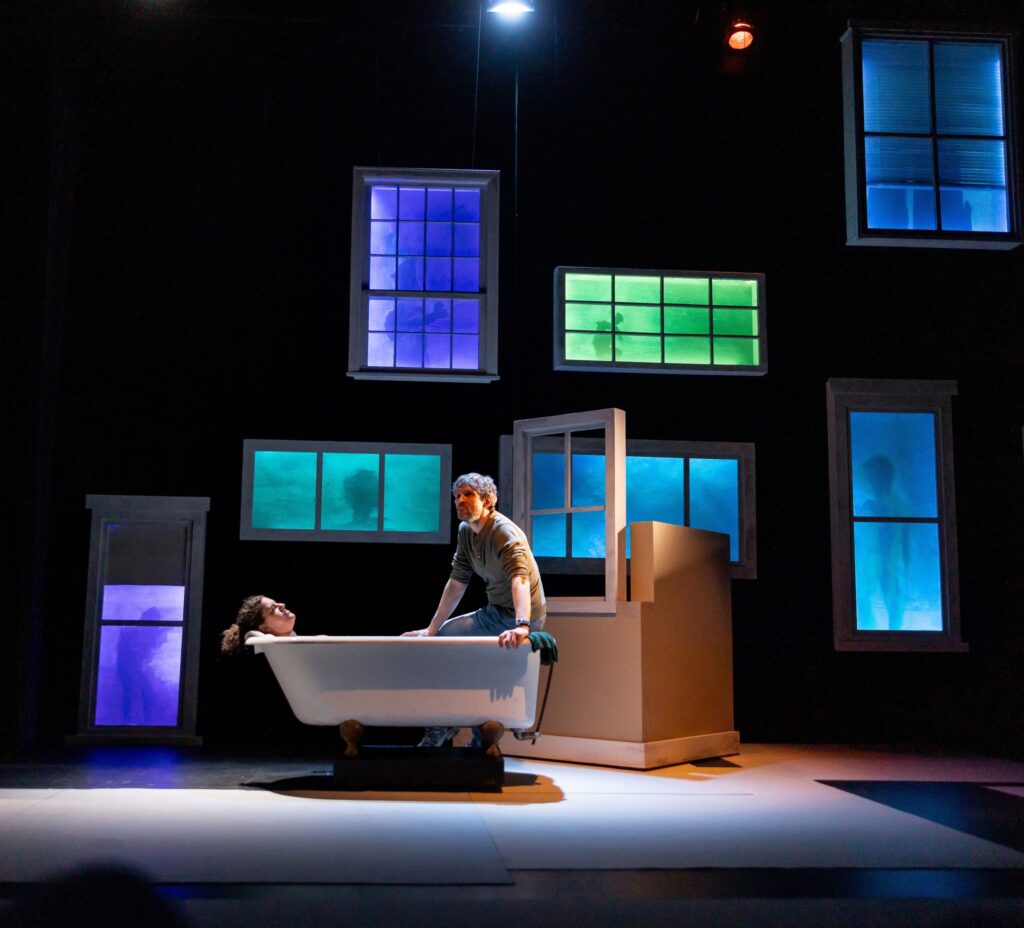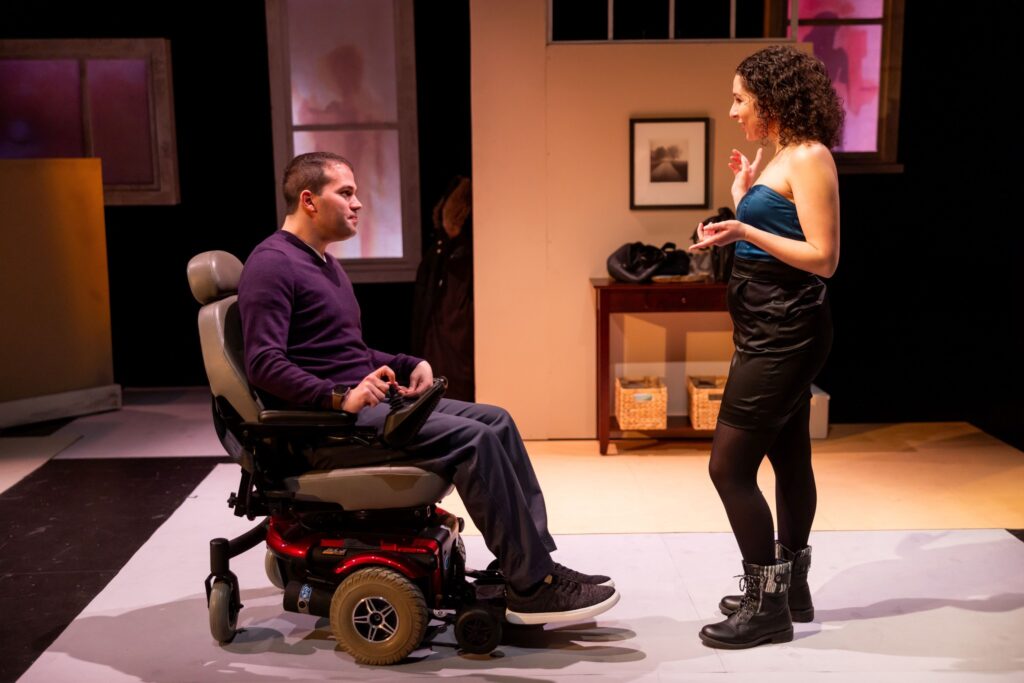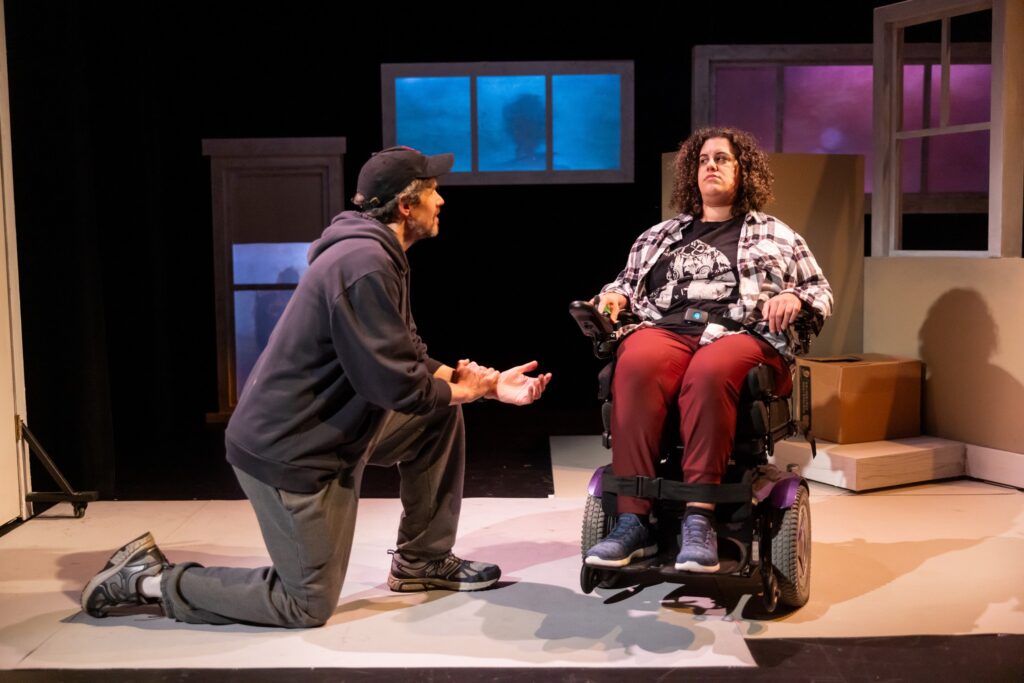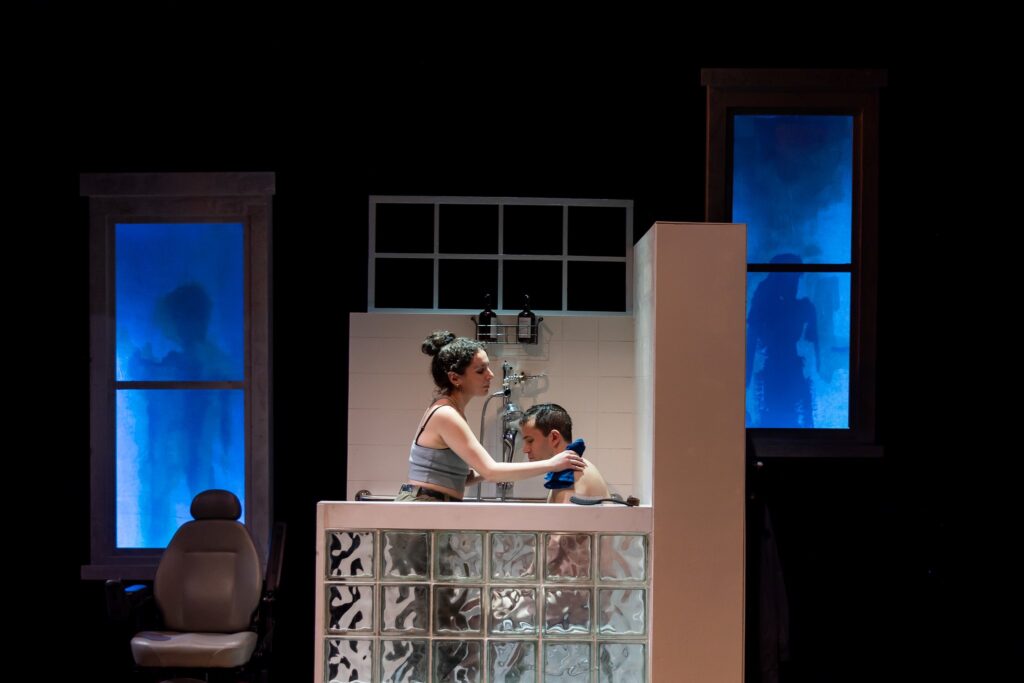
Photos: Nile Scott Studios
Cost of Living – Written by Martyna Majok; Directed By Alex Lonati; Scenic Design by Janie E. Howland; Costume Design by Chelsea Kerl; Lighting Design by Amanda E. Fallon; Sound Design by Anna Drummond. Presented by Speakeasy Stage Company at 527 Tremont St, Boston through March 30th, 2024.
By Shelley A. Sackett
At its heart, ‘Cost of Living,’ is about relationships: how two people meet; how and whether they connect, separate, and reconnect; and how they handle caring and being cared for.
In playwright Martyna Majok’s magic hands, the fact that one person in each relationship has a disability is secondary (though hardly unimportant). Rather, she focuses on the universal vicissitudes of life — emotional, financial, good luck and bad, good health and illness — and how we handle them. The delicacy and craftsmanship of that artistic feat won her the 2018 Pulitzer-Prize award for Drama.
In ‘Cost of Living,’ everyone carries baggage, some external and others internal. The richness of Majok’s script lies in the way she peels back her character’s outer, tougher layers to reveal the softer, vulnerable center within.
Eddie (a magnificent Lewis D. Wheeler) is an unlucky former long-distance trucker. We meet him in a bar in the play’s riveting opening monologue, during which he pours out his grief over the recent loss of his wife, Ani (a top-notch Stephanie Gould). We learn quite a bit about him. He is funny, lonely and somewhat introspective. He is also boyishly guileless in a way that’s hard to resist. He is 12 years sober, struggles to make ends meet, and believes his dead wife can text him from the beyond, where he hopes she is having the time of her afterlife.

In flashbacks, we meet Ani, Eddie’s estranged wife. Just released from the hospital after a horrific car accident that shattered her spine, she must learn to adjust to life as a paraplegic who needs constant care. She is alone with her wheelchair in an apartment filled with boxes and gloom.
Suddenly, Eddie shows up, unannounced and unexpected. These two are in that marital purgatory of married but separated, separated but not yet divorced, and from the get go, it is easy to see that whatever flame drew them together initially still smolders.
Their easy going banter and underlying affection shines through even Ani’s most withering and acerbic comments. “We have too much dirt on each other,” Ani says, and she doesn’t mean that that’s necessarily a bad thing. Eddie just wants to be near her, needs to be near her, even though he now lives with the woman who was the reason the marriage broke up.
Ani gives him no end of lip, but Eddie, resolute and undaunted, cajoles and pleads and turns on his considerable charm. Eventually she relents, and Eddie becomes her full time caregiver.
Across town in a tonier part of New Jersey, lives John (an effective Sean Leviashvill), a wealthy and nit-picky (think Niles Crane in “Frasier”) Princeton University doctoral student who happens to have cerebral palsy. We meet him in his wheelchair as he is interviewing — make that grilling — Jess (an outstanding Gina Fonseca) for the job as his early morning caretaker.
“How much life have you lived?” he demands over and over again. Turns out that Jess, a first generation working-class graduate of Princeton, has lived plenty. She works at a bar often until 4 am, but assures John she can handle the hours, physical demands and intellectual sparring that caring for him would involve.
She says she needs the money, but it’s clear she needs more than that. This job provides as much a life line for her as she would for John.
The more John tries to dissuade her, the more Jess digs in her heels, determined to land this job. Even at this meet and greet, it’s evident that these two will be a good match. Despite the gaping disparities in their physical abilities and economic class, they are intellectual equals who enjoy a good academic romp.

“Working all the time doesn’t seem like a life,” John tells her right before hiring her. Unspoken but communicated telepathically is Jess’s response: Neither does sitting alone in a fancy apartment. These are two kind-hearted, lonely people who need each other’s care in more ways than they realize.
Over the course of 90 minutes (no intermission), these two relationships develop in tandem and, thanks to Janie E. Howland’s clever set, side by side. The action switches seamlessly from Ani’s meager digs to John’s upscale apartment with the rolling in and out of various props and sectioned set pieces.
We really feel as if we are there in the room with these couples. Howland built a perimeter of walls and peppered them with large window frames that house backlit silhouettes. The effect creates a space where the audience feels both the discomfort of being watched (and judged?) and the relief of being in a safe and cozy environment, sealed off from the outside world which can look in but not enter.
In the show’s two most affecting scenes, the stage is magically transformed into a bathroom. Eddie pushes Ani onstage in a full length tub of water (Amanda E. Fallon’s lighting design is breathtaking) and tenderly washes her for the first time since the accident. Although Ani loses none of her acerbic edge, there is a playful tenderness that shines through. Eddie wears his heart on his sleeve, caring and solicitous in ways he probably wasn’t during their marriage. Watching these two have a second chance at getting back to the essence of what drew them together in the beginning is as emotionally satisfying as it is structurally effective.
Equally touching is the scene where Jess showers John. His edges soften as he trusts her with his vulnerabilities and fears. She responds with affectionate competence and confidence, allaying his concern while basking in the closeness she yearns for.
In less skillful hands, these scenes could have been sappy, awkward or implausible. Under Alex Lonati’s spot on, sensitive direction, they instead serve as a magic keyhole through which the audience really gets inside these characters’ skins and witnesses their revelations that they are lonely and alone. Each not only discovers they need people; they also discover they need to be needed. These are regular people with imperfections and eccentricities, and the four actors who play them are engaging and believable.

As Jess, Fonseca struts her tough girl stuff but the challenges and pain that lurk just below the surface are impossible to hide. Wheeler is a stand out as Eddie, so at ease in his role that it’s hard to separate the two. He IS Eddie. Both Leviashvili and Gould were born with cerebral palsy, and they bring a special sensibility to their roles.
Although Gould says she did a lot of hiding when she was growing up because her disability was emotionally and physically painful, she’s more comfortable and confident now. “I want to show people that disabled actors are just as worthy of stage time as ‘normal’ actors,” she told the Boston Globe. After viewing her in ‘Cost of Living,’ it’s clear she has done just that — and more. For tickets and information, click here.

